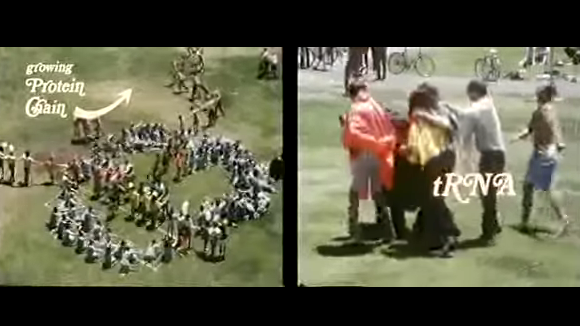
With the principles of molecular biology very much in the zeitgeist these days, we thought it would be handy to provide some sort of visual aid to help our readers understand the complex molecular machines at work deep within each cell of the body. And despite appearances, this film using interpretive dance to explain protein synthesis will teach you everything you need to know.
Now, there are those who go on and on about the weirdness of the 1960s, but as this 1971 film from Stanford shows, the 60s were just a warm-up act for the really weird stuff. The film is a study in contrasts, with the setup being provided by the decidedly un-groovy Paul Berg, a professor of biochemistry who would share the 1980 Nobel Prize in Medicine for his contributions to nucleic acid research. His short sleeves and skinny tie stand in stark contrast to the writhing mass of students capering about on a grassy field, acting out the various macromolecules involved in protein synthesis. Two groups form the subunits of the ribosome, a chain of ballon-headed students act as the messenger RNA (mRNA) that codes for a protein, and little groups standing in for the transfer RNA (tRNA) molecules that carry the amino acids float in and out of the process.
The level of detail, at least as it was understood in 1971, is impressively complete, with soloists representing things like T-factor and the energy-carrying molecule GTP. And while we especially like the puff of smoke representing GTP’s energy transfer, we strongly suspect a lot of other smoke went into this production.
Kitsch aside, and with apologies to Lewis Carroll and his Jabberwock, you’ll be hard-pressed to find a modern animation that captures the process better. True, a more traditional animation might make the mechanistic aspects of translation clearer, but the mimsy gyre and gimble of this dance really emphasize the role random Brownian motion plays in macromolecular processes. And you’ll never see the term “tRNA” and not be able to think of this film.
0 Commentaires